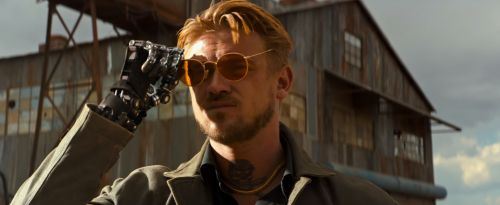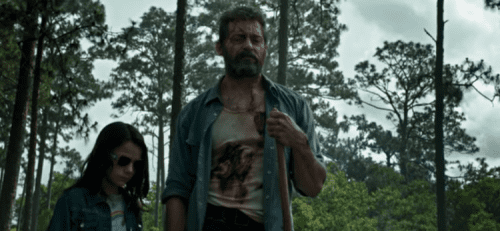Movies /
Comics Movie Reviews
Review: Logan (2017)
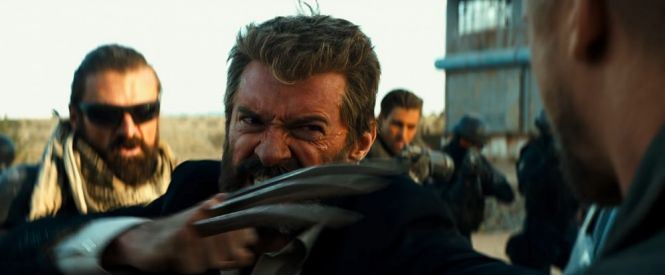
By Andy Frisk
March 15, 2017 - 23:14
Structurally, Logan (2017), written and directed by James Mangold, is a western/chase film. It's the film's characters and themes that make it so much more, not to mention the phenomenal acting of Hugh Jackman as Logan, Patrick Stewart as an aging Charles Xavier, and Daphne Keen as Laura/X-23.
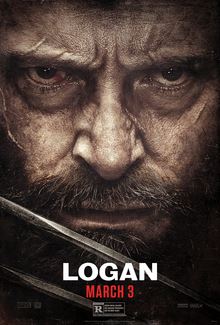 |
An escapee from a genetic project in Mexico City designed to create and grow custom mutant killing machines meets up with an aging Logan, whose hero days are long behind him. Laura, the young mutant escapee, is trying to get to a safe haven across the U.S. border in Canada in order to reunite with her fellow escapees, but Logan is happy living his golden years in relative obscurity with a mentally deteriorating Charles Xavier and mutant outcast Caliban. The world has deteriorated along with Xavier's mental capacity, and mutants, much like civil American society, are virtually non-existent. As Xavier says to Logan though, "Doesn't Laura remind you of anyone?" Logan realizes that she does, both physically and, more importantly, mentally and spiritually. One last innocent needs protecting, but is Logan, physically, and also more importantly, mentally and spiritually up to the task?
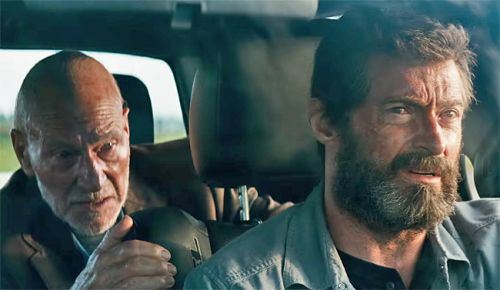 |
There is no world threatening plot. There's no apocalypse or days of future past to avoid. There's only a world, more specifically a United States, that is slipping into a slow whimper of an end due to its rampant corporatism, bigotry, and intellectual vapidity, inhabited by two men who are chased by the demons of their personal pasts and an innocent girl who needs not only guidance, but the love of a family she's never known. There's plenty of remorse, regret and blinding aggression, but there is plenty of love, hope and lucid kindness as well. Logan, reluctantly fulfilling his promise to be a hero one more time by saving Laura from her cyborg enhanced pursuers, loses much along the way, but gains the kind of peace he sought, and never fully achieved, through his surrogate father/son relationship with Xavier and partner/lover relationships with Mariko and Jean Grey. This peace comes through the unlikely, and unorthodox, father/daughter relationship he achieves with Laura. Old Man Logan may have had a long and violent path toward obtaining peace, and ended up finding it in a most unlikely of relationships, but obtain it he does. The audience takes this one last journey with him, and ends up reflecting, and identifying with, Logan's journey. You're saddened as well as uplifted by it, and left enriched by the story's end. This is what cinematic artistry is all about, and
Logan definitely fits the definition.
Comic book movies aren't usually this poignant and artistic, and haven't been since 2008's
The Dark Knight. They also aren't supposed to be this violent.
Logan is definitely a hard R for graphic violence and language, but like the film's reality based themes, the reality based violence only makes it that more powerful in a viscerally emotional way. Logan bleeds. Those who would do violence to his adopted family (which is what the cast of mutants in each
X-Men film really are to each other) do as well. As Laura states at one point though, in retort to Logan's admonishing of the fact that she will have to "learn to live" with the fact that she's killed many men, the men she's killed "were all bad." Bad is an understatement. They are genocidal and blindly devoted to their own sense of perverted morality, not unlike those fanatical enough in America who follow, and more inexcusably, normalize demagoguery because it fits their own faulty religious, racist, or corporatist views. The bad men Laura kills seek to create the perfect followers devoid of morality and restraint, but only succeed in doing so when they create a being with no soul. Or in other words, a clone of their own spiritually empty selves.
Logan is the type of superhero film, and the type of character, who would be hard pressed to exist in the Marvel Cinematic Universe and can only exist as a member of the X-Men family of films. There are some powerfully conflicted and complicated characters in the MCU (particularly in the brilliant Captain America films
Winter Soldier and
Civil War), but none with the social and political relevance that The X-Men family of characters embody. The X-Men have always served as Marvel Comics' metaphoric and allegorical take on oppressed minorities. There is an inherent type of realistic violence that infuses their stories since the violence is often not the result of a dastardly plot to take over the world, or secure power or money for oneself, but to oppress and/or exterminate a minority that is labeled the "other." It's the type of violence that is all too real, as well as all too horrific and inhuman, in its practice. Logan's, both the character and the film's, violence is reflective of the type of soul scarring violence that only a history of mankind's killing of one another for racial or cultural reasons can incur on a society or individual. This violence is not meaning to be glorified here. It's meant to disturb in order to draw serious attention to the underlying real world theme of violence done in the name of hate.
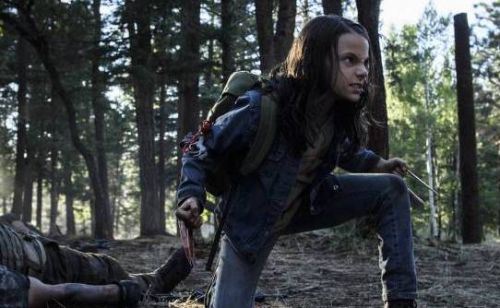 |
Again, superhero films are not necessarily supposed to be this deep and rewarding as works of art, but they can be.
Logan is one of the few that reach these artistic heights, not only through its talented directing and acting, but through its themes and message. The X-Men family of films, if they would end here, as Hugh Jackman's turn as Logan/Wolverine has, couldn't have gone out better.
Rating: 10 /10
Last Updated: January 17, 2025 - 08:20



